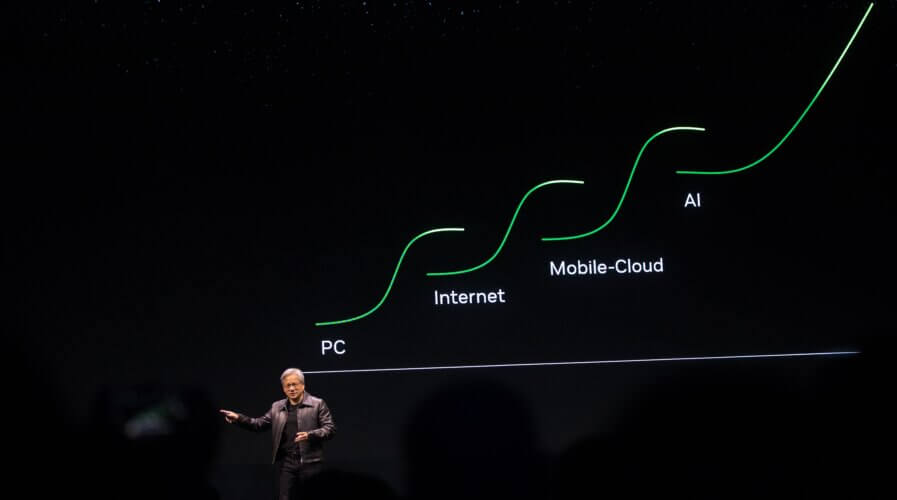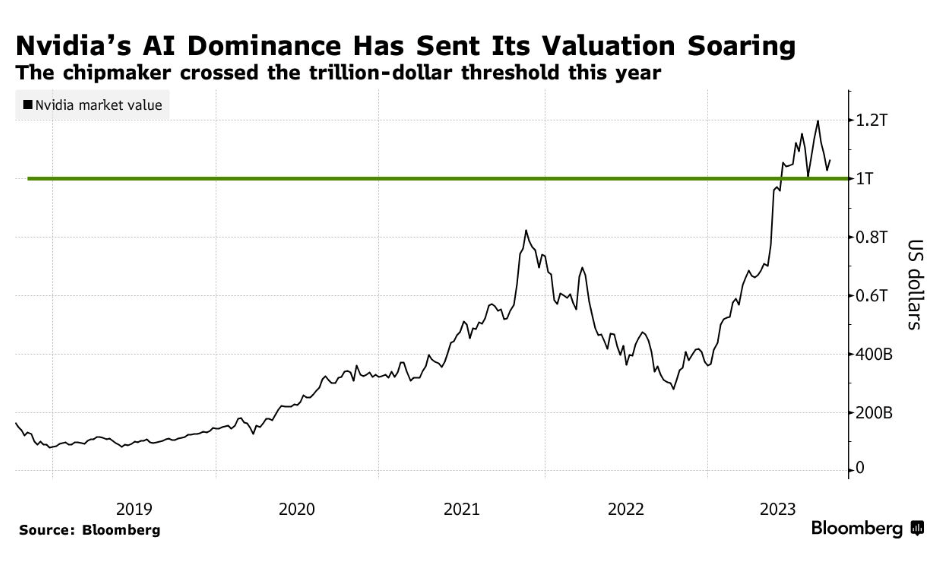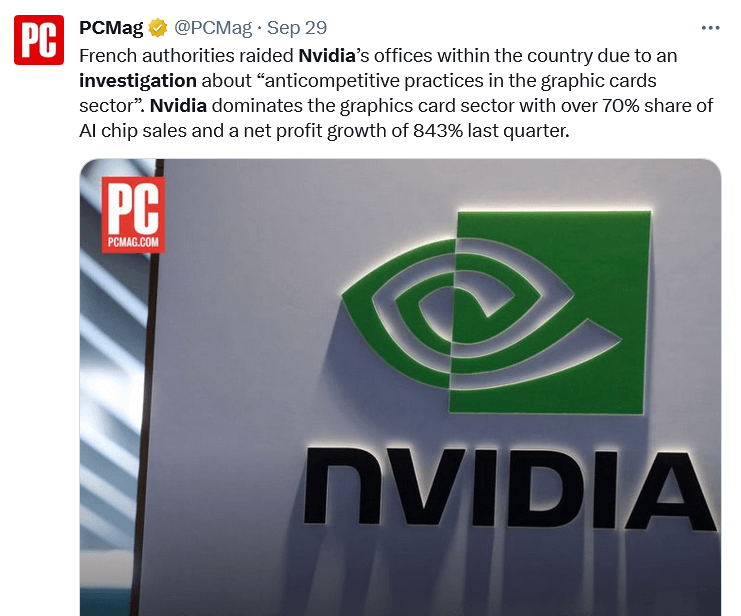
The EU is investigating Nvidia for anti-competitive abuses in the AI chips market.Source: Shutterstock
Is Nvidia abusing its dominance in the AI market?
- The EU is investigating Nvidia for anti-competition abuses in the AI chips market.
- The early-stage investigation may never result in a formal probe or even penalties.
- French authorities have also been interviewing market players on Nvidia’s key role in AI chips, its price policy, the shortage of chips, and its impact on prices.
Nvidia Corp, the company that dominates the market for the graphics chips needed to power AI applications, has been a clear winner in this year’s AI frenzy. The company’s meteoric rise shows investors’ growing confidence in the future of AI and high-performance computing. With an overwhelming 95% share of the GPU market, Nvidia’s products have become virtually indispensable in the realm of AI.
The company’s GPUs, which first became popular in video games, are increasingly essential to new systems used to train large language models and other types of AI software. So much so that Nvidia’s supremacy in building AI chips has chilled other players within the industry.
But the stronger Nvidia grows in this area, the harder it has become for companies attempting to build competing chips. Now, such scale and influence have led Nvidia to face its first significant regulatory scrutiny – and it might lead to further probes from other regulators in the future.
France: The first country to investigate Nvidia
It all started when France’s competition authority said it had raided a company belonging to the “graphics cards sector” on September 27, without disclosing further details. People familiar with the raid told the Wall Street Journal (WSJ) that the operation had targeted Nvidia, the world’s largest maker of chips used for AI and computer graphics.
Based on the company’s website information, Nvidia has an office in France, at Courbevoie. “Raids do not presuppose the existence of a breach of the law,” France’s competition authority said in the statement, “which only a full investigation into the merits of the case could establish, if appropriate.”
Such raids are typically hours-long exercises in which officials turn up early, search a company’s premises, seize physical and digital materials, and interview employees who arrive for work. “The French authority said it had received approval from a judge for the raid,” the WSJ said.
What instigated a raid is the broader inquiry into the cloud-computing sector, in which the French authority cited concerns that players within the industry could use their access to computing power to exclude smaller competitors. For context, big tech, including Amazon.com, Microsoft, and Alphabet’s Google, leads the cloud computing sector, with large data centers in operation.
Those cloud companies own tens of thousands of Nvidia’s chips, which were initially made to process computer graphics, but have become the computational workhorses behind the AI boom. In a report published in June, the French competition authority noted that “increasing use of AI will drive growth in demand for cloud services.”
Without citing Nvidia specifically, the authority said that competition regulators must “ensure that established players do not hinder the development of smaller or new players” based on new cloud technologies. Despite news of the raid in France, two French companies announced deals to expand their offerings of Nvidia’s most powerful AI chips, the H100s. French telecommunications operator the Iliad Group said it was installing those chips in the heart of a Paris-area data center.
OVHcloud, a cloud services company, said it would add H100s to the Nvidia processors it offers its customers for AI applications. That has been the reality for Nvidia, especially in the last ten months. The company’s GPUs have become one of the hottest commodities in the tech world, with cloud computing providers struggling to get enough of them.
The company has said that it is trying to boost the supply of its products as fast as possible to meet the surging demand. This year alone, Nvidia’s sales have surged, propelling it beyond a US$1 trillion valuation in June. By the middle of this year, analysts estimated that Nvidia would have a 90% market share in AI chips, as it introduces newer, more powerful versions of the hardware.

The company became the first chipmaker to achieve a trillion-dollar valuation earlier this year. Source: Bloomberg
France is not alone in probing Nvidia in the AI market
While the French authorities have been interviewing market players on Nvidia’s key role in AI chips, its price policy, the shortage of chips, and its impact on prices, the European Commission has initiated a similar investigation. People familiar with the matter told Bloomberg that the Commission has been informally collecting views on potentially abusive practices in the sector for so-called graphics processing units.
The move is intended to explore whether future intervention could be needed. The early stage investigation by the bloc’s antitrust enforcers may never result in a formal probe or penalties. If or when a formal EU antitrust investigation is launched, firms accused of violations face orders to change their practices and fines of as much as 10% of their global annual revenue.

Has Nvidia created a monopoly on AI chips?
READ MORE
- 3 Steps to Successfully Automate Copilot for Microsoft 365 Implementation
- Trustworthy AI – the Promise of Enterprise-Friendly Generative Machine Learning with Dell and NVIDIA
- Strategies for Democratizing GenAI
- The criticality of endpoint management in cybersecurity and operations
- Ethical AI: The renewed importance of safeguarding data and customer privacy in Generative AI applications






